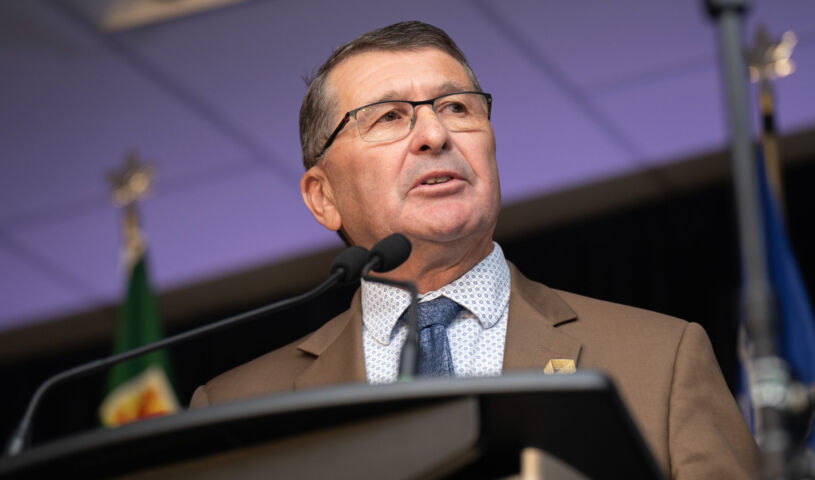After two decades of rural focus, Ray Orb looks to slow down
 After 20 years advocating for rural Saskatchewan, Ray Orb is stepping down to let someone new take over – and allow himself more time to do some fishing. Photo: Saskatchewan Association of Rural Municipalities
After 20 years advocating for rural Saskatchewan, Ray Orb is stepping down to let someone new take over – and allow himself more time to do some fishing. Photo: Saskatchewan Association of Rural Municipalities
After 20 years advocating for rural municipalities in Saskatchewan, Ray Orb is stepping down to let someone new take over.
Back on Aug. 13, Orb, then the president of the Saskatchewan Association of Rural Municipalities (SARM), announced he would be stepping down. At that time, he said he would stay on until the end of the month. But actually, Orb’s last day was Aug. 16.
The announcement may have caught people off guard, but Orb’s decision wasn’t entirely surprising. He announced in March at the SARM convention that he had decided not to run again. A new president will be elected in March 2025. In the meantime, SARM vice-president Bill Huber will take over the president role on an interim basis.
Orb, the reeve of the Rural Municipality of Cupar, also informed his council that he wouldn’t be running again in this fall’s municipal election.
“It was just the right time. It would give our board a chance to do a pivot. But also, I wanted to give our members, any elected officials … a chance to think about it themselves,” Orb said. “My wife and I actually have a place at Elbow along Lake Diefenbaker. We have a boat there and I like fishing. Really, I want to be able to just start slowing down.”
Importance of Listening
Orb was first elected to the SARM board in 2004. Since those early days, he has worked hard to push for change in rural Saskatchewan. Over that time, Orb said he has met “a lot of interesting people” and worked with numerous elected officials and rural administrators.
This opportunity allowed him to meet many sincere, honest people and do what he enjoyed most – listen.
Orb said he always wanted to make listening to the problems that municipalities are facing a priority. To this day, the hope within the SARM board was that solutions could be found. Admittedly, “It’s been a long time,” as some of the issues that existed 20 years ago are still problems today.
Orb said he believes the best approach is to listen to municipalities’ concerns and work collaboratively with SARM members.
“We’ve helped with some issues, but with other issues it’s still ongoing for sure,” Orb said. “I think that idea [of listening to the concerns of members] has filtered down into SARM because we like to consult with our members, and we like to be hearing what they’re actively saying.”
Addressing Rural Issues
Orb entered municipal politics in 1985. He was elected as a councillor in the Rural Municipality of Cupar before becoming reeve in 1995. Over time, he would serve as a SARM director (2004) and vice-president (2010), before being elected as president in 2015.
Over that time, he has seen a lot of changes to the political landscape in Saskatchewan.
The province has cities, towns, villages, and rural and resort municipalities, all facing a variety of challenges. But one thing Orb said they share, at least in general, is that he sees them all being in “pretty good shape.”
While his focus has been on rural municipalities, there has also been interaction with urban municipalities. Orb and the SARM team often meet with city mayors across Saskatchewan. They have worked closely with SUMA (formerly, Saskatchewan Urban Municipalities Association). They have met with numerous organizations to promote the idea that they need to sit down with their neighbouring municipalities in order to work out the issues addressing them all.
Impressing upon their urban neighbours, as well as their provincial and federal counterparts, about the importance of rural issues has certainly been a challenge. But Orb said the conversations are getting better.
However, there remain ongoing issues. For example, there are infrastructure issues where one municipality will be affected by the changes made in another. To address this, SARM has been trying to promote ideas such as uniform zoning bylaws where municipalities could work together.
“I think we have better ways of communication. I think other organizations, other municipal associations especially, understand SARM and what they’re doing,” Orb said. “It’s improved over the years, but I think we’ve still a way to go.”
State of Rural Governments
Orb said it can’t be denied that rural municipalities are a driving force in the Saskatchewan economy. Not many years ago, the province came out with a plan for growth where there was agreement around the need for rural municipalities to produce more.
But while they need to produce more agricultural product, municipalities also need more funding for road infrastructure. Saskatchewan, Orb said, has almost 1,400 bridges – which might seem odd to a lot of people for a prairie province.
The cost of infrastructure is an ongoing issue for rural communities, to the point where a lot of them can’t afford to build bridges. They’re just not getting enough funding. Another key concern is rural broadband. Rural communities need better broadband, not to mention better cell coverage. As such, SARM has continually lobbied the province for greater supports.
Policing and rural crime is a big issue, not only in Saskatchewan, but also across the country. And rural areas, Orb said, continue to be underserved. Foreign land ownership is another issue Orb said the members are saying needs to be looked at.
Education Tax Victory a Big Win
One thing Orb does celebrate as an accomplishment during his time at SARM is the education property tax (EPT). Prior to 2004, before Orb was elected to the SARM board, many rural municipalities were struggling with high education tax rates.
At that time, the local school board set the education mill rate, putting many rural residents and municipalities in an untenable position, Orb said. There was so much education tax that was put on the farmland that many rural municipalities couldn’t raise their own mill rate.
If they wanted to build more roads or make other improvements, many rural municipalities held back because they didn’t want to further raise taxes and hurt local farmers. After a lot of work by SARM, the province started setting the mill rate for education. That system remains in place today.
“That’s actually saved farmers, I would say, hundreds of millions of dollars,” Orb said. “That was a big accomplishment, and that one really stands out to me the most.”
Love the Job, Not the Hours
Orb is quick to say he will miss the job. He will miss the interactions he had with people. But one thing he won’t miss is all the time he lost on his farm and with his family. Orb grew up on a farm and enjoyed working as a farmer. But he had to give up farming because his work with SARM was too much to allow him time to do both jobs.
Now, while he is stepping away from the political space, people shouldn’t assume he is retiring. He is thinking about it, of course. And maybe in the meantime he will do something to help the wider community. That might be with rural municipalities. It might be with some advisory group. But the bottom line, he said, is that he isn’t “closing a door.”
He just isn’t sure what the future will hold. Well, that’s likely not entirely true. Orb said one thing he can say is that he plans to spend more time with his wife Val, their children, and grandchildren. Also, a lot of his free time will be spent on his fishing boat at Lake Diefenbaker. But beside all that, he’ll just see what happens.
“I’m not going to miss the time that I had to dedicate (to the job), but I liked doing it. Don’t get me wrong, enjoyed every minute of it,” Orb said. “I’m slowing down for sure. But I don’t intend to fully retire, but I’m just not sure what that looks like yet.” MW
✯ Municipal World Executive and Essentials Plus Members: You might also be interested in Ken Coates’ article: Growing gap for non-metropolitan communities.
Sean Meyer is digital content editor for Municipal World.
Related resource materials:


